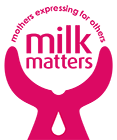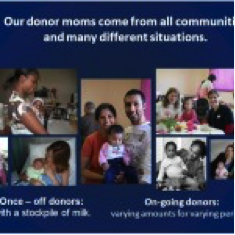BECOMING A BREASTMILK DONOR
Why donate breastmilk?
Donated breastmilk is a gift that gives hope, health and life.
Becoming a breastmilk donor is:
- Easy
- Possible for most breastfeeding mothers
- Potentially life-saving for premature babies
Just 50ml of breastmilk can feed a baby of less than 1kg for 24 hours.
Every drop really does count!
The results of a premature baby not having access to breastmilk can be devastating. A lack of breastmilk for a premature baby can lead to:
- serious infections & complications
- major surgery (with life-long ramifications)
- death
All over the world it is recognised that only breastmilk offers premature babies the nutrition and protection essential for their survival.
When a vulnerable baby’s own mother is unable to supply sufficient breastmilk, a breastmilk bank can offer this life saving gift from another mother.
Demand for donor milk far outstrips our supplies, leaving vulnerable babies without access to donor milk.
Can you help?
It takes a few tablespoons of spare breastmilk and following just 5 easy steps to become a Milk Matters Breastmilk Donor.
DID YOU KNOW
W.H.O. says KMC could save about 450 000 babies a year…Becoming a Breastmilk Donor in 5 Easy Steps
 © Milk Matters
© Milk Matters
If you are a healthy, lactating woman then you could become a Milk Matters breastmilk donor – and your donated milk could save babies lives.
We welcome:
- on-going donations of breastmilk
- once-off donations of stockpiled frozen breastmilk
Only breastmilk in excess of what your own baby needs should be donated. Please do not donate milk at the expense of your own baby – your baby comes first!
5 Easy Steps to Donate Breastmilk:
- STEP 1. Contact Milk Matters and arrange to obtain the following:
-Donor Screening Form
-HIV / Hepatitis B test Consent Form
-Donor Information Sheet
-Sterile Containers
-Details of nearest Milk Matters depotMilk Matters: 021 659 5599 / 082 895 8004 / info@milkmatters.org
- STEP 2. Read the Donor Information Sheet for important details regarding procedures when donating breastmilk – essential to ensuring your donated breastmilk is safe for the recipient babies.
- STEP 3. Complete the Screening & Consent Forms and return them to Milk Matters.
- STEP 4. Once you have some milk frozen for donation, obtain the HIV/Hep B Test Request Form from Milk Matters and take it to your nearest PathCare Laboratory for a blood sample to be taken (free of charge).
- STEP 5. Pre-arrange to deliver your frozen breastmilk to a Milk Matters depot and collect more sterile containers. N.B. Ensure milk is labelled!
Milk Matters appeals to donors to assist us by using our depots for drop off and collection. Should this not be possible, we will make every effort to collect your breastmilk donations and deliver sterile jars to you.
The incredible experience of Gabi’s premature birth gave us the unexpected opportunity to make a real difference to the lives of others by donating breastmilk.
What Happens to My Donated Breastmilk?
It is crucial to ensure the safety of the donor breastmilk supplied to the very vulnerable recipient babies in hospitals.
A number of steps are therefore followed between the time a donor mother drops off her donation of breastmilk and when it is supplied to hospital neonatal intensive care units (NICUs) for premature and ill babies in their care.
- Donor mother screening:The donor mother must have completed the screening process and all results checked by Milk Matters before her milk is processed.
- Pooling of milk (single donor only):Milk from a single mother is pooled and transferred into sterile containers in specific volumes. Breastmilk from different mothers is never mixed together.
- Pasteurisation:Breastmilk is pasteurised using the Holder Method of Pasteurisation. Pasteurising destroys bacteria and viruses while retaining most of the beneficial properties of breastmilk. After pasteurisation, milk is rapidly cooled and then frozen.
- Laboratory testing:Samples of breastmilk from each batch of milk pasteurised are tested in microbiology laboratories for infective contamination.
- Storage:Pasteurised breastmilk that has been cleared for use is stored frozen until it is supplied to hospitals.
- Distribution:Donor breastmilk is supplied on prescription to hospitals for babies in their care who meet certain criteria. It is important that donor milk supports rather than undermines breastfeeding by the baby’s own mother, so the use of donor milk is strictly monitored for this reason as well as for health and safety reasons.
It felt wonderful to be able to help other moms and babies in the same way that I had been helped. It has been very special to be both a donor and recipient of breastmilk through the milk bank.
Who Donates?
Healthy, lactating mothers from all communities choose to donate their surplus breastmilk to help babies in need. They know it can give hope and life to babies whose lives are at risk.
Most breastfeeding mothers are able to donate breastmilk. A particularly abundant milk supply is not required in order to donate breastmilk since just a few tablespoons of milk can feed a baby for a whole day.
Remember, by expressing breastmilk for another baby, you will not deprive your baby in any way – in fact, expressing increases milk production.
Breastmilk is produced on a supply and demand basis, so the more milk is removed, the more is made.
Milk Matters welcomes regular small donations of breastmilk just as much as larger quantities. It all goes towards helping babies who desperately need breastmilk. Every drop counts!
All breastmilk donors are screened and the donated breastmilk is screened and pasteurised to ensure the donor milk is safe for the recipient babies.





